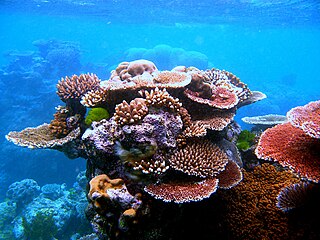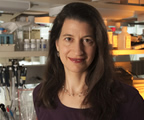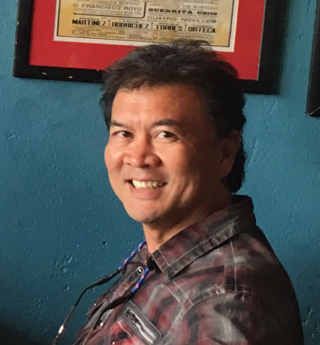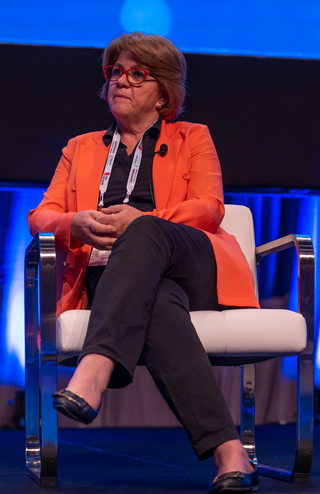
Corals are colonial marine invertebrates within the class Anthozoa of the phylum Cnidaria. They typically form compact colonies of many identical individual polyps. Coral species include the important reef builders that inhabit tropical oceans and secrete calcium carbonate to form a hard skeleton.

Microbiota are the range of microorganisms that may be commensal, mutualistic, or pathogenic found in and on all multicellular organisms, including plants. Microbiota include bacteria, archaea, protists, fungi, and viruses, and have been found to be crucial for immunologic, hormonal, and metabolic homeostasis of their host.

Alexandra (Alex) Z. Worden is a microbial ecologist and genome scientist known for her expertise in the ecology and evolution of ocean microbes and their influence on global biogeochemical cycles.
Microbial phylogenetics is the study of the manner in which various groups of microorganisms are genetically related. This helps to trace their evolution. To study these relationships biologists rely on comparative genomics, as physiology and comparative anatomy are not possible methods.

Karen Nelson is a Jamaican-born American microbiologist who was formerly president of the J. Craig Venter Institute (JCVI). On July 6, 2021 she joined Thermo Fisher Scientific as Chief Scientific Officer.

A microbiome is the community of microorganisms that can usually be found living together in any given habitat. It was defined more precisely in 1988 by Whipps et al. as "a characteristic microbial community occupying a reasonably well-defined habitat which has distinct physio-chemical properties. The term thus not only refers to the microorganisms involved but also encompasses their theatre of activity". In 2020, an international panel of experts published the outcome of their discussions on the definition of the microbiome. They proposed a definition of the microbiome based on a revival of the "compact, clear, and comprehensive description of the term" as originally provided by Whipps et al., but supplemented with two explanatory paragraphs. The first explanatory paragraph pronounces the dynamic character of the microbiome, and the second explanatory paragraph clearly separates the term microbiota from the term microbiome.

Julie Angela Segre is the Chief and Senior Investigator of the Translational and Functional Genomics Branch in the National Human Genome Research Institute at the National Institutes of Health. She was elected to the National Academy of Medicine in 2019, the American Academy of Arts and Sciences in 2020 and the National Academy of Sciences in 2022.

Jessica Green is an American entrepreneur, engineer, and ecologist. She is CEO of Phylagen, Inc., a biotech startup developing tools to monitor the microbiology of air. Prior to Phylagen, she was a Professor of Biology at the University of Oregon and co-founding director of the Biology and Built Environment Center. Green’s two talks at the TED Conferences on the Microbiomes of the built environment have received over 1.7 million views.

Dawn Yvonne Sumner is an American geologist, planetary scientist, and astrobiologist. She is a professor at the University of California, Davis. Sumner's research includes evaluating microbial communities in Antarctic lakes, exploration of Mars via the Curiosity rover, and characterization of microbial communities in the lab and from ancient geologic samples. She is an investigator on the NASA Mars Science Laboratory (MSL) and was Chair of the UC Davis Department of Earth & Planetary Sciences from 2014 to 2016. She is Fellow of the Geological Society of America.
Endozoicomonas gorgoniicola is a Gram-negative and facultative anaerobic bacterium from the genus of Endozoicomonas. Individual cells are motile and rod-shaped. Bacteria in this genus are symbionts of coral. E. gorgoniicola live specifically with soft coral and were originally isolated from a species of Plexaura, an octocoral, off the coast of Bimini in the Bahamas. The presence of this bacterium in a coral microbiome is associated with coral health.

Jose V. Lopez is an American-Filipino Molecular Biologist. He has been a faculty member and Professor of Biology at Nova Southeastern University (NSU) in Dania Beach, Florida, since 2007. Lopez has contributed as a co-founder of the Global Invertebrate Genomics Alliance (GIGA), a community of scientists. He has also participated in the "Porifera—Tree of Life," "Earth Microbiome," and Earth BioGenome projects.

All animals on Earth form associations with microorganisms, including protists, bacteria, archaea, fungi, and viruses. In the ocean, animal–microbial relationships were historically explored in single host–symbiont systems. However, new explorations into the diversity of marine microorganisms associating with diverse marine animal hosts is moving the field into studies that address interactions between the animal host and a more multi-member microbiome. The potential for microbiomes to influence the health, physiology, behavior, and ecology of marine animals could alter current understandings of how marine animals adapt to change, and especially the growing climate-related and anthropogenic-induced changes already impacting the ocean environment.

Abigail A. Salyers was a microbiologist who pioneered the field of human microbiome research. Her work on the bacterial phylum Bacteroidetes and its ecology led to a better understanding of antibiotic resistance and mobile genetic elements. At a time where the prevailing paradigm was focused on E. coli as a model organism, Salyers emphasized the importance of investigating the breadth of microbial diversity. She was one of the first to conceptualize the human body as a microbial ecosystem. Over the course of her 40-year career, she was presented with numerous awards for teaching and research and an honorary degree from ETH Zurich, and served as president of the American Society for Microbiology.

Kimberly B. Ritchie is an American marine biologist. She is an Associate Professor in the Department of Natural Sciences at the University of South Carolina Beaufort. Her research is focused on marine microbiology and how microbes affect animal health in hosts such as corals and sharks.
Jennifer B. H. Martiny is an American ecologist who is a professor at the University of California, Irvine. Her research considers microbial diversity in marine and terrestrial ecosystems. In 2020 she was elected a Fellow of the American Association for the Advancement of Science.
Vanessa Olivia Ezenwa is an American ecologist, and is a professor of ecology and evolutionary biology at Yale University. Her research considers the ecology of infectious diseases amongst animal populations. In 2020, she was selected by The Community of Scholars as one of the most Inspiring Black scientists in the United States.

María Gloria Domínguez-Bello is a Venezuelan-American microbial ecologist that has worked on adaptations of gut fermentation organs in animals, gastric colonization by bacteria, assembly of the microbiota in early life, effect of practices that reduce microbiota transmission and colonization in humans, and effect of urbanization. She is the Henry Rutgers Professor of Microbiome and Health at Rutgers University, New Brunswick. Her lab at collaborates in multidisciplinary science, integrating microbiology, immunology, pediatrics, nutrition, anthropology, environmental engineering and architecture/urban studies, and microbial ecology.
Rachel J Whitaker is a professor of Microbiology in the School of Molecular and Cellular Biology at the University of Illinois at Urbana-Champaign. Her laboratory's research focuses on the evolution of Archaea, Bacteria, and Viruses in both natural and clinical environments.

The holobiont concept is a renewed paradigm in biology that can help to describe and understand complex systems, like the host-microbe interactions that play crucial roles in marine ecosystems. However, there is still little understanding of the mechanisms that govern these relationships, the evolutionary processes that shape them and their ecological consequences. The holobiont concept posits that a host and its associated microbiota with which it interacts, form a holobiont, and have to be studied together as a coherent biological and functional unit to understand its biology, ecology, and evolution.
Ashley L. Shade is the Director of Research at the Institute of Ecology and the Environment within Le Centre National de la Recherche Scientifique. Shade is an associate professor at Michigan State University in the Department of Microbiology and Molecular Genetics and Department of Plant, Soil and Microbial Sciences. She is best known for her work in microbial ecology and plant-microbe interactions.














